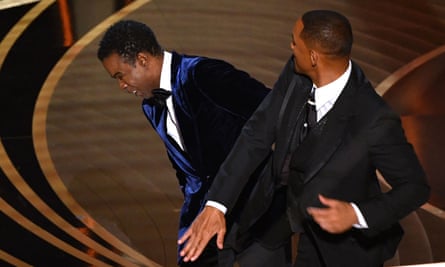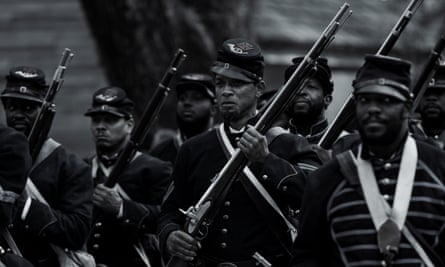A major new film about a real-life escaped slave premiered this week. Emancipation is the story of “Whipped Peter”, who fled barbaric forced labour on a railroad in 1863 and went on a perilous 10-day journey through the Louisiana swamps before finding refuge at a Union encampment. Photographs of his back, a mesh of welts and strafe marks, shocked Americans and aided the abolitionist cause.
Reviews were largely ecstatic, praising its commitment to the brutal truth and the unflinching, moving performance of its leading actor. A shoo-in for awards glory, presumably?
No, for Emancipation is the comeback vehicle of Will Smith, who last year squandered decades of goodwill by slapping Chris Rock on stage at the Oscars after the comedian made a joke about Smith’s wife’s shaved head. (It is still unclear whether Rock was aware of Jada Pinkett Smith’s alopecia.)
An hour after the assault, Smith was back on stage, tearfully picking up his best actor award for his role in King Richard, to a standing ovation. But the actor – and the Academy – had misjudged public opinion and, in the following days, both apologised profusely.
The star was banned from all Oscars events for the next decade but allowed to keep his award, and there is nothing to prevent him being nominated for – or winning – another one in the interim. Although picking it up might be a problem.
“In a normal world, his performance in Emancipation would be Oscars catnip,” says Steven Gaydos, executive director of trade magazine Variety. “And it feels like it might still be, in some way.”
Such stories tend to be a natural hit with awards voters: in 2014, Steve McQueen’s 12 Years a Slave – the true story of Solomon Northup, a freeman kidnapped and sold into slavery in 19th-century Louisiana – won eight Oscars including best picture. Two years later, Nate Parker’s directorial debut, The Birth of a Nation, about the man who led a slave rebellion in 1831 Virginia, was the big hit of Sundance and looked set to make a clean sweep at the Oscars until unsavoury details about Parker’s past surfaced and he became an early villain of the #MeToo movement.
Emancipation finished filming in January, two months before the slap, and although it cannot have been substantially retrofitted in the editing suite, the film does helpfully support Smith’s own explanation of his behaviour.
Speaking to the late-night TV host Trevor Noah this week, Smith again made reference to his childhood in trying to explain the “bottled rage” unleashed at Rock.
“It was a lot of things,” said Smith. “It was the little boy that watched his father beat up his mother. All of that just bubbled up in that moment.”
In Smith’s memoir, published last year, he writes of murderous thoughts towards his father and a feeling of persistent shame that he did not do more to protect his mother – a feeling many have referenced at his reaction to the slur against his wife.
Emancipation contains scenes in which his character puts himself on the line to prevent physical harm being inflicted on his wife and children. It also shows how Peter is sustained by an unswerving Christian faith, which is shared by Smith himself and to which he made reference during his best actor acceptance speech and in contrite videos since.
Emancipation’s director, Antoine Fuqua, has said that he felt the rigours of the film’s shoot would have contributed to Smith’s stress and pressure two months later.
In the movie, Peter endures considerable physical and emotional hardship. Battling extreme hunger, thirst and injury, Peter must evade a vicious “man-hunter” and his pack of bloodhounds while also contending with alligators, swarms of bees, extreme weather, burning buildings and, finally, the full explosive might of the Confederate army.

The decision by Apple, the studio behind the film, to press ahead with the release, despite the climate of negative publicity, has not met with the blowback many would have anticipated earlier in the year.
The film’s apparent resonance with Smith’s own circumstances – and the positioning of actor and character as both survivors and victims – are elements of a carefully calibrated marketing campaign that appears to be paying dividends.
While speculation about any awards recognition for the film was deemed ludicrous six months ago, this week pundits from awards site Gold Derby are tipping it for nominations in at least the cinematography category – and potentially more, including screenplay, supporting actor and director. Smith’s fearful assertion to Noah that his actions could have jeopardised recognition of his colleagues’ achievements on the film may have struck a chord with many in the industry.
“They’re handling it well,” says Gaydos. “Smith has re-emerged into the media and into awards season in a way no one predicted a few months ago. I don’t think the real damage to his career is yet visible. And it’s likely that his not getting an Oscar nomination for Emancipation might be part of that damage. But that’s a small price to pay.
“Still, we’re in no man’s land here. Nobody quite knows what might happen.”
In August a Q Score study – which measures public popularity in the US – found Smith’s standing had plummeted dramatically. Yet there have been stirrings online of a pendulum-swing back to the star; a sense that compared with misdemeanours of other celebrities witnessed over the past year, Smith’s transgression was not so bad. Some have argued that racist social attitudes caused a mass overreaction to the incident.
The actor himself, meanwhile, has gone above and beyond to speak of it alongside much more serious missteps, thereby highlighting the difference. He told Noah he would “completely understand” viewers who found Emancipation unpalatable on account of his actions in March.
“You can’t put the toothpaste back in the tube,” says Gaydos. “If you do something that violates the reason you’re a leader, it’s deadly. You can’t undo your basic myth – which in Smith’s case was of him being an affable, positive, disciplined, great guy.”
Yet the evolution of Smith’s image, which had already begun with more mature roles such as that in King Richard, may be able to take on board the radical events of the spring.
“He will never again be magical and captivating in the same way,” says Gaydos. But while for the likes of Kevin Spacey “there is no comeback to the heights of stardom and acclaim he once had”, for Smith a new phase is conceiveable.
“He’s converted Emancipation into an opportunity. And, considering what happened, so far everything has gone his way.”

